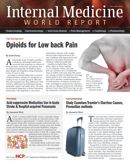Publication
Article
Internal Medicine World Report
Acid-suppressive medication for Acute Stroke, Hospital-acquired Pneumonia
Author(s):
For hospitalized patients, some stays are extended by comorbidities including pneumonia, which can present additional health concerns. A recent study looked at the effect of acid-suppressive medications for stroke patients in an effort to prevent them catching pneumonia as well.

For hospitalized patients, some stays are extended by comorbidities including pneumonia, which can present additional health concerns. A recent study looked at the effect of acid-suppressive medications for stroke patients in an effort to prevent them catching pneumonia as well.
The results of the study were published by the American Neurological Association following a clinical trial of more than 1,600 patients in Boston between June 2000 and June 2010. The patients were all over the age of 18 and had been hospitalized for more than 2 days.
According to the authors, the medication was ordered for 1,340 of the 1,676 patients and 289 cases of hospital-acquired pneumonia were reported. According to the data the patients who were prescribed acid-suppressive medication were more likely to be diagnosed with pneumonia (20.7% vs. 3.6% odds ration = 7.0, 95% confidence interval = 3.9-12.7).
After adjustment, the authors reported an odds ration of 2.3 (95% CI= 1.2-4.6.) There was also a greater likelihood for patients given proton-pump inhibitors (OR = 2.7, 95% CI = 1.4-5.4). The data was not as dramatic for those prescribed histamine-2 receptor antagonist (OR = 1.6, 95% CI = 0.8-3.4).
When looking at the inspiration for the study the authors noted that patients who receive a diagnosis of pneumonia during hospitalization for stroke, “may also lead to poorer functional outcome and promote long-term disability.”
“Identification of modifiable risk factors for pneumonia after stroke is important as a prelude to developing effective prevention strategies that could help reduce the morbidity, mortality and healthcare costs from stroke.”
Several factors, they added, contributed to the chances of a patients developing pneumonia including the severity of the stroke, age, other comorbidities, and other interventions including mechanical ventilation.
“Our results demonstrate that the risk factors from acid suppressive medications are considerable in the hospitalized stroke population even after accounting for several other influential covariates,” the authors said.
As for what separated the acid suppressive medications from other potential treatment options, the authors pointed out several key differences. This included, “demonstrated modification of the upper gastrointestinal flora and, resultantly respiratory flora in the setting of a less acidic gastric medium. “
“This may predispose patients to pneumonia in the setting of aspiration, a common complication of acute stroke,” they said.
While previous studies have looked at what can be done to reduce the risk of pneumonia and finding patients more predisposed to the condition, the authors determined the necessity for more work.
“Our results suggest that acid-suppressive medications are an independent risk factor for pneumonia in stroke patients, and more restrictive use of these medications, especially in high-risk patients such as those who are elderly or with aspiration, could be an important part of an effective prevention strategy.”
The study was funded in part by an NIH National Institute on Aging grant, as well as a grant from the Doris Duke Charitable Foundation to Harvard Medical School. They also received grants from the NIGH National Institute of Deafness and Other Communication Disorders and from the NIH National Institute of Neurological Disorders and Stroke.”






